Unit 3.6 The Concert
Maharashtra State Board Class 10 English Solutions Unit 3.6 Warming Up Questions and Answers
Question 1.
Pair up with your partner and ask and answer the following questions.
(a) Do you like music?
(b) What does a concert mean?
(c) Have you ever attended any live concert?
(d) Have you seen a concert on Television?
(e) Whose concert would you love to attend?
Answer:
(a) Yes, I do.
(b) A concert is a musical programme where musicians and classical singers come together to play different pieces of music.
(c) Yes, I have.
(d) Yes, I have.
(e) I would love to attend the concert of A. R. Rahman.
Question 2.
Look at the web diagram given below and study the traits of a good concert organizer.
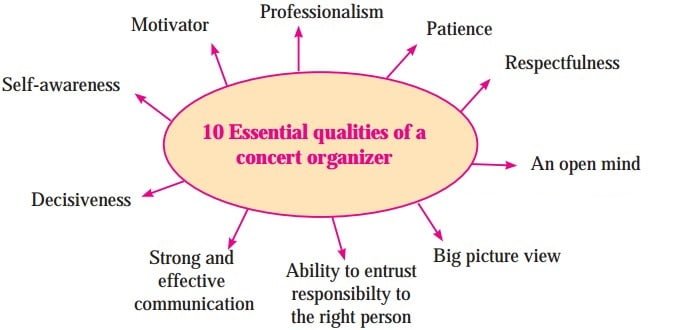
Answer:
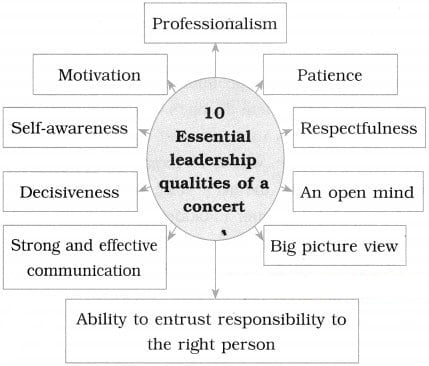
Question 1.
Who said to whom?
(a) “We mustn’t miss the chance.”
(b) “This is not the last time they are going to play.”
(c) “A walk in the park might make you feel better.”
(d) “Tomorrow morning we perform for the boy- Yes?”
Answer:
Statement | Who | To Whom |
(a) “We mustn’t miss the chance.’’ | The boy | To his sister and mother |
(b) “This is not the last time they are going to play.” | the mother | to anant |
(c) “A walk in the park will make you feel better.” | Aunt Sushila | to smita |
(d) “Tomorrow morning we perform for the boy- Yes?” | Ustad Sahib | to Pandit Ravi Shankar. |
Question 2.
Read the following sentences and write which emotions are revealed from these sentences.
(a) Pandit Ravi Shankar is playing tomorrow at the Shanmukhananda auditorium.
(b) It’s the chance of a lifetime.
(c) Will you come to Aunt Sushila’s house and play for him?
(d) Did you…did you hear him?
(e) Is it…It’s not possible?
Answer:
(a) excitement
(b) anticipation, joy, excitement
(c) This sentence expresses the emotion of a sincere plea or entreaty. Smita is practically begging Pandit Ravi Shankar to consider her request.
(d) This sentence expresses the boy’s innermost curiosity, and his desire to confirm if his sister had indeed heard the performances of the musicians whom he so longed to hear.
(e) This sentence expresses the emotion of complete surprise and disbelief. Something the neighbours had thought absolutely impossible was indeed a reality.
Question 3.
Read the text carefully, you will find some words describing a particular specialty of the individuals/personalities in the text. Explain the meaning of the following words given in the table with reference to the particular personality mentioned in the text.
Speciality | Personality | Explanation |
Maestro
|
…………………..
|
…………………..
|
Answer:
Specialty | Personality | Explanation |
Ustad | Allah Rakha | title for an expert tabla player |
Moustachioed | Name unknown | someone who sports ’ a prominent bushy mustache |
Maestro | Pandit Ravi Shankar | a distinguished performer of classical music |
Pandit
| Ravi Shankar | a talented musician (used as a respectful title or form of address) |
Question 4.
Describe the condition of Smita when she was going towards the stage. Read the text again and complete the boxes given below. One is done for you.

Answer:
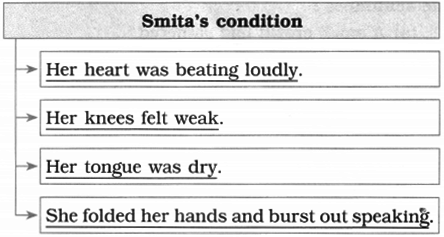
Question 5.
The whole story revolves around Anant. Write a short paragraph on Anant. Take help of the following points to develop the paragraph.
1. Health
2. Disease
3. Early interests
4. Intense desire/wish
5. Fulfillment of desire/wish.
Answer:
Anant was a fifteen-year-old boy, living in a village named Gaganpur with his sister and parents. Very active in his school days, he was a good athlete, the best table-tennis player, could play the sitar very well and had even been composing his own tunes. Suddenly, he was struck with cancer and came to Mumbai for treatment. Then one day, his sister read in the newspaper that Pandit Ravi Shankar would be performing at the Shanmukhananda auditorium.
It was his earnest desire to watch the performance, but due to his sickness, his mother forbade him. Finally, his sister, in a very daring move, went to the concert and after the concert had ended, went backstage and requested Pandit Ravi Shankar to come to their home and play for her brother. The great generous maestro along with Ustad Allah Rakha agreed and did exactly that. As the beautiful soulful music wafted around the room where Anant lay, Anant breathed his last.
Question 6.
The story has three important characters- Anant, Smita and Aunt Sushila. Go through the story again and complete the following table that highlights their special traits of character. You can put X mark if that trait is not mentioned in the text.
Special traits | Smita | Anant | Aunt Sushila |
Strength
|
Answer:
Special traits | Smita | Anant | Aunt Sushila |
Strength | daring | courage | concern, generosity |
Weakness | given to emotion | physical health | X |
Dreams | that her brother would get cured | that he would hear Pandit Ravi Shankar play | X |
Motivation | love for her brother | love for music | love for the children |
Question 7.
The two contradictory pictures are depicted in the story. Discuss in pairs and describe them in your words in front of the class.
Answer:
The brother and sister seem excited about Pandit Ravi Shankar’s upcoming performance. The girl expresses excitement and the boy’s eyes are shining. The mother, however, is more worried about the physical condition of her son, who is on oxygen and apparently out of breath. The mother’s voice breaks when she speaks and her lips utter unbidden prayers. These are the contradictory images presented in this passage.
Question 8.
The text has a big collection of Indian words in it. Using words from another language in a write up is called Code-mixing. Make a list of all the Indian words in table A and their meanings in table B. One is done for you.
‘A’ Indian word | ‘B’ Meaning |
1. Raga | (a) piece of Indian classical music based on one of the six basic musical modes. |
2. | (b) |
3. | (c) |
4. | (d) |
5. | (e) |
6. | (f) |
Answer:
‘A’ (Indian word) | ‘B’ (Meaning) |
1. Raga | (a) piece of Indian classical music based on one of the six basic musical modes. |
2. Pandit | (b) a talented musician (used’as a respectful title or form of address) |
3. sitar | (c) a large, long-necked Indian lute with movable frets, played with a wire pick |
4. Ustad | (d) a highly skilled musician |
5. Pandit | (e) address for a talented classical musician |
6. divan | (f) a long low sofa without a back or arms |
Question 9.
(A) Choose the appropriate Adverb or Adjective form to fill in the gaps.
(1) She spoke in an …………………….. tone. (excited / excitedly)
(2) Smita accepted the suggestion …………………….. (grateful / gratefully)
(3) They gave him whatever made him …………………….. (happy/ happily)
(4) He ran very …………………….. (fast / fastly)
(5) He would become a …………………….. sitarist some day. (great / greatly)
(6) Life went out of him …………………….. (gentle / gently)
Answer:
(1) excited
(2) softly
(3) happy
(4) fast
(5) great
(6) gently
(B) Rewrite in Indirect speech
1. “Please”, she begged him, “Please come”.
……………………………………………………………………
2. He said, “What shall we do, Ustad Sahib?”
……………………………………………………………………
3. Her brother said, “Enjoy yourself”. He added, “Lucky you!”
……………………………………………………………………
4. ‘Yes’ Panditji replied. “It’s settled then. Tomorrow morning we shall perform, for the boy.”
……………………………………………………………………
Answer:
(1) She begged him repeatedly to come.
(2) He asked the Ustad Sahib what they should do.
(3) Her brother told her to enjoy herself and then added that she was indeed lucky.
(4) The Panditji replied in the affirmative and added that the matter was then settled. He further added that they would perform for the boy the following morning.
Question 10.
The text mentions names of stalwarts like Pandit Ravi Shankar and Ustad Allah Rakha. Both have earned world wide name and fame for their outstanding contribution to the field of music. Form groups of 5 students each and write a brief note on other stalwarts in this (music) field. You can take help of your school library or search the relevant information on the internet.
Take help of the following points.
1. Name :
2. Field : Music
3. Specialisation : Tabla/Sitar/Violin etc.
4. Guru :
5. Early life :
6. Education :
7. Early success :
8. Contribution to the field and world :
9. Awards:
10. Any special incident that has occurred in his/her life :
Answer:
Pandit Hariprasad Chaurasia
Hariprasad Chaurasia is an Indian classical flutist. He plays the bansuri, an Indian bamboo flute in the Hindustani classical tradition.
His Guru was Bholanath Prasanna of Varanasi. He studied with him for eight years. In 1957, he joined the All India Radio, Cuttack, Odisha. He worked as composer and performer. Much later, he received guidance from the reclusive Annapurna Devi, daughter of Baba Allaudin Khan. Legend has it that she agreed to teach him only if he played with the left hand. True or not, up till today, Hariprasad plays the bansuri with the left hand.
Apart from classical music, Hariprasad has collaborated with Shivkumar Sharma, the santoor exponent forming an association called Shiv-Hari. He has collaborated with world musicians, including the fusion group Shakti, in experimental cross-cultural performances.
He is at present the artistic director of the World Music Department at the Rotterdam Music Conservatory in the Netherlands. In 2006, he founded the Vrindavan Gurukul in Mumbai and in 2010, the Vrindavan Gurukul in Bhubaneshwar. Both of these institutes are schools dedicated to training students in bansuri in the Guru-shishya tradition.
He has collaborated with several western musicians, including John McLaughlin, Jan Garbarek, and Ken Lauber, and has composed music for Indian films.
Chaurasia also played on The Beatles’ 1968 B-side ‘The Inner Light’, which was written by George Harrison.
Question 11.
Imagine you are the monitor of your class. You are assigned the task to invite a classical singer as a chief guest for the Annual Day Programme. Write a letter of invitation to a famous classical singer. Take help of the following points.
Write in short –
1. About your school.
2. About the Annual Day Programme
3. Interest and love of students for music.
4. Motivation.
Answer:
Dilip Rane
Sulochana Devi High School
Mahatma Phule Chowk
Dhule – 424 001,
Date: 20 November, 2020
Shri Gangadin Murkathe
Govardhan Society
Videhi Nagar
Dhule – 424 003.
Subject: Invitation as Chief Guest for the Sulochana Devi High School Annual Function
Dear Sir,
As monitor of Std. X A, Sulochana Devi High School, it is my privilege to invite you to our School Annual Day Function on 15th January, 2021 as Chief Guest.
It will be an evening filled with song and dance, and the first person we thought of was you, as you are an eminent classical singer in your own right. Most of us know about you and have heard your songs either on DVD or on FM.
Our students are highly interested in the classical genre and many are under training at various local i classes. Your presence will serve as motivation for our budding talent and give us pointers as to future careers in music.
Please confirm your presence; for us it will be an honour.
Yours truly,
Dilip Rane,
Monitor (Std. X A)
Question 12.
Write who said to whom:
Answer:
statements | Who | To whom |
(a) You’ll wake him up. | The mother | To her daughter |
(a) “The chance of a lifetime.” | Anant | to his mother |
(c) “Your father will take you.” | Smita’s mother | to Smita |
Question 13.
Complete the following web:
Answer:
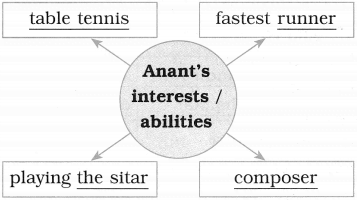
Question 14.
Why was Smita excited?
Answer:
Smita was excited because she read in the newspaper that Pandit Ravi Shankar was to play the next day at the Shanmukhananda auditorium.
Question 15.
What was the chance of a lifetime for Anant?
Answer:
To be able to hear and see Pandit Ravi Shankar perform was the chance of a lifetime for Anant.
Question 16.
Give reasons: Smita became nervous.
Answer:
Smita became nervous because she remembered that her brother was very ill and that the doctors had given up hope. The truth that Anant was going to die frightened her.
Question 17.
Write from the passage antonyms for the following words:
(a) bored
(b) forget
(c) worse
(d) worst
Answer:
(a) bored x excited
(b) forgot x remembered
(c) worse X better
(d) worst X best
Question 18.
(1) Choose the appropriate Adverb or Adjective form to fill in the gaps:
(b) I wished the noise would stop. It seemed to go on ……………, (endless, endlessly)
Answer:
(b) endlessly
Question 19.
Add question tags:
(a) You know he needs all the sleep and rest he can get.
(b) You’ll wake him up.
(c) His eyes were shining.
(d) We mustn’t miss the chance.
Answer:
(a) You know he needs all the sleep and rest he can get, don’t you?
(b) You’ll wake him up, won’t you?
(c) His eyes were shining, weren’t they?
(d) We mustn’t miss the chance, must we?
Question 20.
The boy on the bed was not asleep: (Rewrite without ‘not’.)
Answer:
The boy on the bed was awake.
Question 21.
How would you feel and react if you came to know that someone closely known to you was suffering from cancer?
Answer:
If I came to know that someone closely known to me was suffering from cancer, I would feel very bad. I would visit the person, spend time, make the person happy in every way possible and most of all pray to God, to relieve the person from suffering.
Question 22.
Say whether the following are True or False: (The answers are given directly and underlined.)
Answer:
(a) In Bombay, the family stayed with their aunt.
(b) The doctors told the family directly that Anant did not have many days to live.
(c) The family voiced their fears to Anant.
(d) Anant was well enough to take part in the forthcoming table tennis tournament.
Answer:
True
False
False
False
Question 23.
Why was everyone from the family trying to keep Anant happy?
Answer:
Everyone from the family was trying to keep Anant happy because they knew he did not have many days to live. They did not wish to voice their fears but rather wanted him to be surrounded by whatever made him happy.
Question 24.
Why was Smita not ready to go for the concert?
Answer:
Smita was not ready to go for the concert because she and her brother, Anant, had always done things together.
Question 25.
Write from the passage phrases that mean:
(a) participate
(b) feeling that something good will happen
(c) express their worries
(d) a rare opportunity
Answer:
(a) take part In
(b) high hopes
(c) voice their fears
(d) a chance of a
(e) lifetime.
Question 26.
Match the columns:
A | B |
(a) choked
|
(i) exercises
|
Answer:
A | B |
(a) choked
|
(iv) voice
|
Question 27.
Complete the sentence with proper option: Smita accepted the suggestion (grateful/gratefully)
Answer:
Smita accepted the suggestion gratefully.
Question 28.
Frame Yes-No questions to get the sentences as the answer:
(a) There’s no harm in trying it.
(b) It would be nice to go to the concert.
Answer:
(a) Is there any harm in trying it?
(b) Wouldn’t it be nice to go to the concert?
Question 29.
*Two contradictory pictures are depicted in the story.
Answer:
On the one hand, the family is aware that Anant does not have many days to live. They are worried. They have fears but they suppress them. Instead they laugh and smile and talk. They surround Anant with whatever makes him happy. They fulfil his every need and give him whatever he asks for.
Question 30.
(1) Complete the following flow-chart:
Answer:
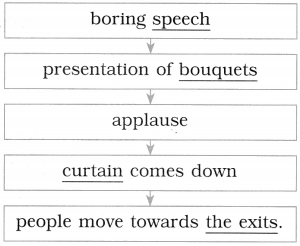
Question 31.
Write whether the following statements are True or False:
(a) Smita dreamt that she was at the concert.
(b) Anant had said, ‘The chance of a lifetime’ the previous evening.
(c) At the end of the concert, the artistes stood and clapped for the audience.
(d) A man with a long moustache was one of the artistes.
Answer:
(a) False
(b) True
(c) False
(d) False
Question 32.
(1) Arrange the following sentences chronologically according to their occurrence in the passage:
(a) The first notes came over the air.
(b) The audience gave the artistes a standing ovation.
(c) The audience gave the great master a thundering welcome.
(d) The ragas unfolded.
Answer:
(c) The audience gave the great master a thundering welcome.
(a) The first notes came over the air.
(d) The ragas unfolded.
(b) The audience gave the artistes a standing ovation.
Question 33.
How did Smita enjoy the concert?
Answer:
Smita felt as if the gates of a land of enchantment and wonder were opening. She listened spellbound to the unfolding ragas.
Question 34.
Give one example of code-mixing (Indian word) from the passage and explain its meaning.
Answer:
raga – a musical mode in Indian classical music
Question 35.
Pick the odd man out from the following based on the passage and give reasons:
(a) sitting, thundering, unfolding, twinkling
(b) slow, boring, plaintive, twinkling
Answer:
(a) sitting (verb – all the others are adjectives)
(b) boring (describes the noun ‘speech’ – all the others describe the ‘ragas’)
Question 36.
Underline the adverbs:
(a) The curtain came down.
(b) The plan remained firmly in her mind.
(c) The plan she had decided on the evening before remained firmly in her mind.
Answer:
(a) The curtain came down.
(b) The plan remained firmly in her mind.
(c) The plan she had decided on the evening before remained firmly in her mind.
Question 37.
Have you ever attended any concert? How was your experience there?
Answer:
Yes, I have attended a concert in which A. R. Rahman was the main performer. When I heard the first few notes being sung, I was thrilled. Never before had I heard such music or singing. I felt as if I were transported to a wonderland where only music reigned. Every beat, every note filled me with delight. I began wondering if I were in heaven!
Question 38.
Who said this to whom?
“Tomorrow morning we perform for the boy – Yes?”
Answer:
Ustad Sahib said this to Pandit Ravi Shankar.
Question 39.
Write whether the following statements are True or False:
(1) When Smita returned home, Anant was awake.
(2) Both Ravi Shankar and Ustad Allah Rakha came to Aunt Sushila’s house.
(3) Anant’s room was on the ground floor.
(4) Anant survived the sickness.
Answer:
(1) True
(2) True
(3) False
(4) False
Question 40.
What was Smita’s plan?
Answer:
It was Smita’s plan to plead with Pandit Ravi Shankar to come to her aunt’s house and play the sitar for her brother, Anant, who was suffering from cancer.
Question 41.
Why were the neighbours surprised?
Answer:
The neighbours were surprised to see the two great musicians Pandit Ravi Shankar and Ustad Allah Rakha, getting out of a taxi which pulled up outside their block.
Question 42.
Give one word for each of the following:
(a) a soft compressed lump – …………………..
(b) twist or turn the body with quick – …………………..
(c) an expert at music – …………………..
(d) unseen backstage area on the sides of a stage – …………………..
Answer:
(a) wad
(b) wriggle movements
(c) wizard
(d) wings
Question 43.
(1) State the tense of the underlined verbs in the sentences:
(a) A small crowd had gathered
(b) Her knees felt weak.
(c) “Will you come to Aunt Sushila’s house?”
(d) “Its settled then.”
Answer:
(a) Past Perfect
(b) Simple Past
(c) Simple Future
(d) Simple Present.
Question 44.
Choose the appropriate Adverb or Adjective form to fill in the gaps.
(a) Smita spoke ………………. to Anant. (excited/excitedly)
Answer:
(a) excitedly
Question 45.
Music can calm the mind. Share your views.
Answer:
This is very true. Music has the profound effect of calming the mind, filling the soul of the listener with peace and transporting the devotee to a state of mind that is almost heaven.
Question 46.
(1) Pick out the gerund and use it in a sentence: She had been so excited at seeing the announcement.
(2) Arrange the words in alphabetical order: wooden, word, would, wonder
(3) Make a meaningful sentence by using the phrase: catch the attention of
(4) Write two smaller words hidden in the given word: table-tennis
(5) Identify the kind of sentence: Lucky you!
(6) Spot the errors and correct the sentence: Her knees were felt weak and her tongue being dry.
(7) Write the past participle forms of the given verbs: (1) die (2) stay
(8) Punctuate the sentence: did you hear him he whispered
Answer:
(1) Gerund: seeing Sentence: Seeing is believing.
(2) wonder, wooden, word, would
(3) Sentence: One of the girls in the dance caught the attention of the chief guest.
(4) tablet, table (tennis, able)
(5) Exclamatory Sentence
(6) Her knees felt weak and her tongue was dry.
(7) (1) died (2) stayed
(8) “Did you hear him?” he whispered.
Question 47.
(a) Write sentences using the word ‘rest’ with two different meanings.
(b) Rewrite the sentences beginning with the underlined word: The audience gave the artistes a standing ovation.
(c) Write a word register of 8 words for the word ‘concert’.
Answer:
(a) (1) Those who have finished may leave. The rest will please stay back, (the remaining ones)
(2) You may rest in the afternoon, (stop work in order to relax, sleep or gather strength)
(b) The artistes were given a standing ovation (by the audience).
(c) concert: programme, stage, audience, music, dance, box office, venue, band, (performance, recital, show, gig)
Question 48.
(1) State the kind of sentence and pick out the clause, if any: They knew then that the boy had not many days to live.
(2) Use the two given words in one meaningful sentence: cured, sitar
Answer:
(1) Kind of sentence: Complex Clause: that the boy had not many days to live – Noun clause
(2) The doctor told him that after he was cured he could play the sitar.